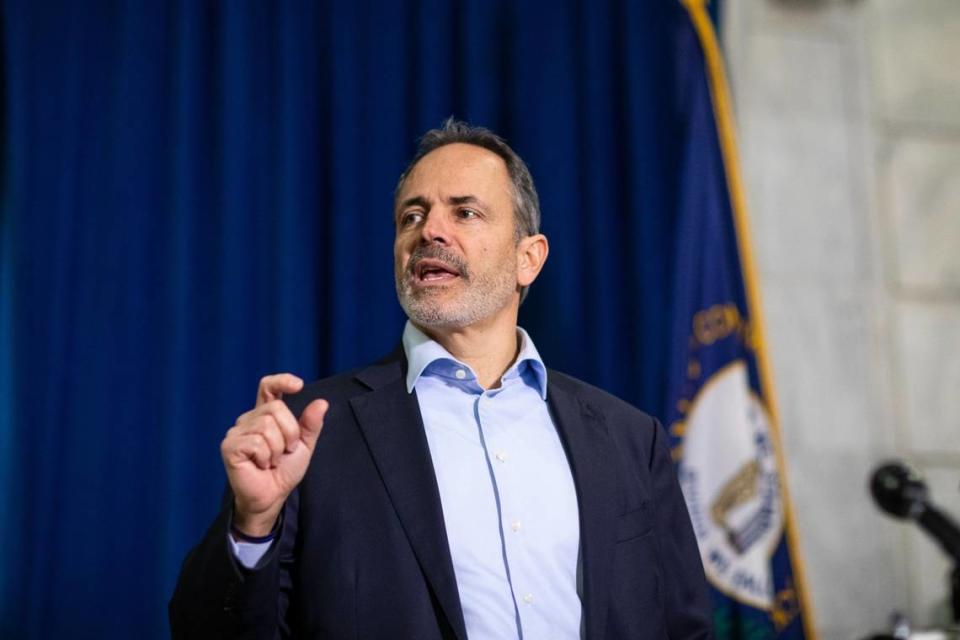Feds convicted Kentucky man after Bevin pardon in state court. He wants a new trial
A Kentucky man who received a controversial pardon from then-Gov. Matt Bevin on a state homicide conviction but was later found guilty in federal court in the same murder is trying again to get his conviction overturned.
Attorneys for Patrick Baker, 46, filed a motion last week in federal court arguing that his attorneys for the August 2021 trial were “constitutionally ineffective” in representing him, in part because they had a conflict of interest.
The new motion also argues that Baker’s attorneys did not adequately develop a claim that federal authorities were vindictively prosecuting Baker, which could have been used in a request to dismiss the indictment.
The representation Baker’s attorneys provided in 2021 fell so far below what was reasonable that he was deprived of effective assistance of counsel, the motion argues.
The motion asks a judge to vacate Baker’s conviction and sentence and give him a new trial.
Attorneys Stefan J. Bing and Benjamin D. Allen with the Lexington firm of Gess Mattingly & Atchison now represent Baker.
The U.S. Attorney’s Office has not formally responded in court but is expected to oppose Baker’s request.
A robbery gone wrong
The motion is the latest development in case that’s gone on for years.
It dates to May 2014, when someone shot and killed Donald Mills, 29, at his home at Stinking Creek in Knox County.
Mills trafficked in large quantities of pain pills.
Baker, who was addicted to pain pills at the time, planned to rob Mills of pills and cash while posing as a police officer, but told others that Mills pulled a gun so he had to shoot Mills, according to court testimony.

A jury in state court convicted acquitted Baker of murder but convicted him of reckless homicide, first-degree robbery, impersonating a police officer and tampering with evidence. A judge sentenced him in December 2017 to 19 years in prison.
The Kentucky Court of Appeals said the evidence of his guilt was “overwhelming” in upholding his conviction.
In December 2019, however, Bevin commuted Baker’s sentence and pardoned him of the crime, saying he thought the evidence against Baker was “sketchy at best.”
The decision was one of hundreds of pardons and commutations that Bevin, a Republican who lost reelection in November 2019 to Democrat Andy Beshear, issued as his term ended, causing an outcry from family members of victims, prosecutors and state lawmakers.

Senate President Robert Stivers said the Republican majority in that chamber condemned the pardons and commutations as a “travesty and perversion of justice.”
The pardon for Baker drew particular scrutiny because members of Baker’s family had held a fundraiser for Bevin in 2018, raising $21,500 to pay debt left from his 2015 campaign.
Democrats in the legislature said the pardon raised an appearance of corruption, but Bevin denied politics played a role in the pardons for Baker or others.
New charge against Baker
Federal authorities picked up cases on some people Bevin pardoned.
The U.S. Bureau of Alcohol, Tobacco, Firearms and Explosives opened a case on Mills’ homicide, and a federal grand jury indicted Baker nearly 18 months after Bevin pardoned him.
Baker’s attorneys argued the new charge violated the rule against punishing someone twice for the same crime.
U.S. District Judge Claria Horn Boom allowed the federal charge to stand, saying the law allows different sovereign governments, Kentucky and the United States, to prosecute a person based on the same conduct.
Federal prosecutors also argued their charge was different — not murder, but murdering Mills while committing a drug crime.
At his trial in August 2021, Baker adamantly denied killing Mills and his attorneys pointed blame at another man, a convicted felon who lived near Mills.
However, jurors convicted Baker after deliberating just over six hours.
Boom sentenced Baker to 42 years in prison but gave him credit for the 30 months he served on the state charge before being pardoned, leaving his sentenced at 39 years and six months.

Baker appealed the conviction, arguing among other things there was not sufficient evidence to convict him and that federal authorities’ decision to prosecute him was vindictive.
The U.S. 6th Circuit Court of Appeals upheld the conviction, ruling that there was sufficient evidence of Baker’s guilt.
The panel also turned aside the vindictive prosecution argument, saying that federal prosecutors generally have “broad discretion” in decisions on charging people.
The judges did say they were “troubled by the timing of Baker’s federal prosecution following his state-law pardon, and by the impression that Baker may not have received such a lengthy federal sentence but for his acceptance of a state-law pardon.”
That’s where Baker’s new effort to overturn his conviction picks up.
Arguments for a new trial
The motion says that while Baker’s former attorneys raised the issue of vindictive prosecution in 2021, they failed to fully investigate the claim, brought it up far too late in the trial process, and proposed to back it up using evidence that was clearly not admissible.
The motion also says the U.S. 6th Circuit erred in turning aside the argument because the judges said federal authorities received new evidence between Baker’s conviction in state court and the federal indictment.
The appeals panel said the new evidence provided a possible explanation, unrelated to any animosity over Baker’s pardon, for the decision to prosecute him in federal court.
However, Baker’s current motion says the new information the judges cited was from a witness who didn’t talk to police until after the federal indictment.
The other leg of Baker’s argument that he should get a new trial is that his three attorneys had a conflict of interest that arose from worries about being held in contempt.
Three lawyers from Louisville — Steve Romines, Rob Eggert and Patrick J. Renn — represented Baker in the 2021 trial.
The judge, Boom, ruled that the defense attorneys could not present a number of clips of out-of-court statements from witnesses during the opening argument because they contained inadmissible hearsay.
Boom said Romines quickly ran afoul of her ruling by referring to an out-of-court statement from a witness during his opening argument. During a private conference at the bench, Boom raised the the possibility of sanctioning him, according to Baker’s new motion.
Not long after, Boom again said Romines had violated her order, warning him he could face sanctions including a fine, jail time or being barred from the court, according to the motion.
Baker’s motion for a new trial argues that his lawyers’ concerns over sanctions during his earlier trial caused them to not represent him as zealously as they should have — meaning their self-interest was in conflict with Baker’s interest.
For instance, Romines said during the trial that he decided not to make some arguments he believed were reasonable out of fear of that he would violate Boom’s ruling and possibly go to jail, according to the motion.
Boom told defense attorneys they shouldn’t be worried about facing sanctions “so long as defense counsel follows the law and the Court’s rulings,” according to Baker’s motion.


